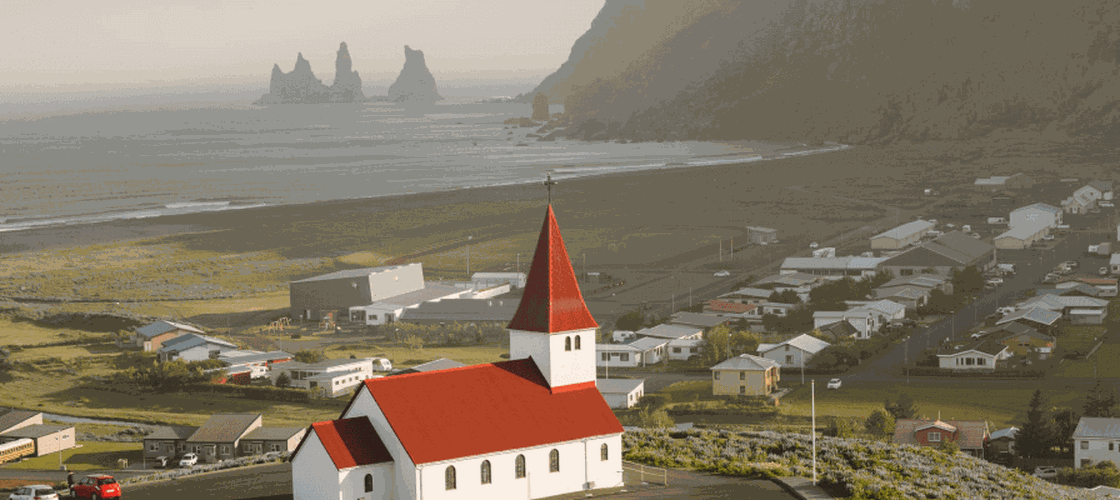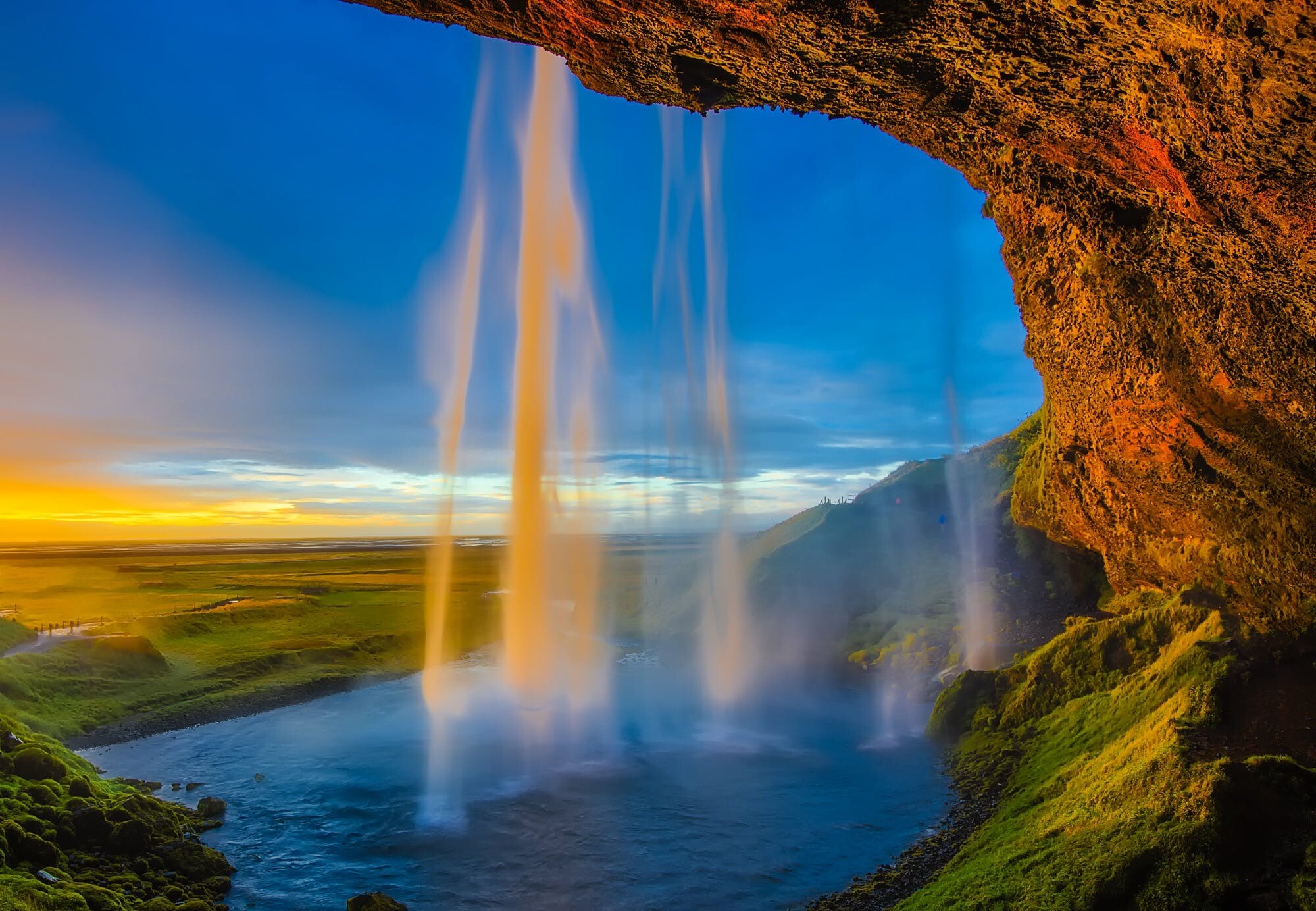Iceland Digital Nomad Visa

Quick Visa Facts
Visa length N/A
Possible to extend? N/A
Who can apply? N/A
Minimum Income Requirements N/A
Time for visa applications N/A
Want to know if you can apply?
Complete a visa quiz and see if you qualify!
Iceland Quick Facts
Iceland is an island in Northern Europe, located between Greenland, Norway, and the United Kingdom. For years it has been catching the attention of many travelers. It’s known as the land of fire and ice and it consists of magnificent glaciers, thundering waterfalls, and epic natural nighttime displays.
Iceland is not just a stunning place to visit, but it’s also the best place to live, ranking first on the Global Peace Index. Additionally, it’s a wonderful place for remote workers as there is now a digital nomad visa for Iceland.
Capital Reykjavik
Form of Government Democracy
Population 357,000
Climate Cold, temperate maritime
Language Icelandic
Currency Icelandic Krona (ISK)

Join the Iceland community!
Join the community of remoters!
Living in Iceland as a digital nomad
Many travelers come to Iceland because it’s a spectacular place to experience the Aurora Borealis, an incredible natural occurrence created when solar particles interact with the atmosphere in the Earth’s magnetic field. If you’re in Iceland in the winter, you might just get a chance to experience it yourself!
Iceland is a wonderful country with unique landscapes. It is covered by ice, volcanoes, and geysers with about 11% of the country covered by glaciers. These glaciers also attract a lot of travelers.
Iceland has a rich history and a deep-rooted culture. It is believed that Vikings landed during the 12th century and they foraged the island of all its resources. And Icelanders love folklore, with many old stories of elves and trolls dating back to the 13th century.
Attractions and best places to visit
Iceland is a fascinating place, and one that has a lot to offer to all of its visitors. In fact, it has become one of the world’s top travel destinations for thrill-seeking adventurers. It’s also popular with nature lovers who are interested in checking out Icelands unique natural landscapes.
There are active volcanoes, geysers, hot springs, glaciers, ice fields, and fjords, so there’s something for everyone.

Near the capital, Reykjavik, you can find the Blue Lagoon and Strokkur Geysir. Slightly to the south, there is Vatnajökull National Park, Landmannalaugar National Park, Hekla volcano and multihued rhyolite mountains. In the national parks you can hike trails, walk on lava fields and even go horseback riding. And of course, if you’re visiting Iceland than you have to see the northern lights, which is most likely in the winter months.
Digital nomad hotspots
The capital city of Iceland, Reykjavik, is the main destination for digital nomads. 60% of Icelanders live in Reykjavik and it’s known as the world’s safest city.
But the best thing about this city is that, even though it’s quite big, it is still surrounded by nature unique geography, geology, and natural wonders. This place is perfect for digital nomads who are looking for a different lifestyle, but still want all the commodities that other big cities offer.
Reykjavik has a good quality of life. The architecture is colorful and quirky, the internet is fast, the food is amazing, and the locals are very friendly. Plus, almost everyone speaks English, so you’ll have no problem communicating with everyone around you.
Cost of Living
Iceland uses the Icelandic Krona as their currency. 1 USD = 128 ISK approximately.
Sadly, Iceland is not the cheapest country. In fact, it is rather expensive if you’re used to more affordable accommodations. A one bedroom apartment in the city center costs around $1,500/month. A bigger apartment will cost you around $2,500/month.
A basic lunchtime menu costs $34 and a combo meal at a fast-food restaurant costs $16.
The entire city of Reykjavik is covered by an efficient bus system. You can travel anywhere in the city by using the local busses. A one-way ticket costs $3.50. You can purchase a Reykjavík City Card, which gives you unlimited travel for 24, 48, or 72 hours. The costs are $33, $45, and $56 accordingly.
Digital nomad essentials
Even though Iceland is a rather remote location, they have easy-access to many of the essentials for digital nomads. In fact, Icelanders rank among the top internet users in the world.

This means that the internet connection in Iceland is great, and you can easily find a connection for your smartphone, laptop, and other devices. Staying connected in Reykjavik is super easy. You’ll find wifi access across the city center. Many restaurants, cafes, bookstores, bars, and hotels offer free wifi to its guests.

Our Community Drives it all
Join the community of remoters!
Visa Overview
Iceland was one of the first Schengen countries to introduce a remote work visa that was created specifically for digital nomads. The digital nomad visa for Iceland allows remote workers to live and work in the country for up to 180 days.
To obtain the visa you must be self-employed or work for a company that is based outside of Iceland, and must earn a minimum of $7763 per month, which is one of the highest income requirements in the world. You must also present proof of health or travel insurance and pay a small application fee.
The application process is quite in-depth, so make sure to follow the steps accordingly. We will explain the whole process below.
It’s strongly recommended that you apply for the digital nomad visa for Iceland from your home country and wait to travel until after you’ve received the visa. If you enter Iceland or any other Schengen country after you’ve applied and before your visa is approved, then that time will be deducted from your visa. For example, if you enter Iceland one month before your visa is approved, instead of being able to stay for six months you’ll only be granted five months.
Additionally, if you apply from within a Schengen country, then your Icelandic visa can only be issued for up to 90 days. So in order to have the full 180 days, you should apply from your home country.
Once you have your Icelandic visa, you can stay in other Schengen countries up to 90 days over your 180-day period. Your time in Iceland will not impact your time in other Schengen countries, even if Iceland is also part of the Schengen zone.

Our Community Drives it all
Join the community of remoters!
Who Can Apply for the Digital Nomad Visa for Iceland

The digital nomad visa for Iceland is known as the Long-term Visa for Remote Work. Anyone who works remotely either for themselves or for a foreign company can apply as long as they meet the requirements.
If you’re granted the visa, you will not be allowed to work for local employers or in participate in the Icelandic labor market. If you have a spouse and/or children, they can apply for a long-term visas as family members of a remote worker.
Here are some of the conditions needed in order to apply for the visa:
You are from a country outside the EEA/EFTA
You do not need a visa to enter the Schengen area
You have not been issued a long-term visa in the past twelve months from the Icelandic authorities
The purpose of the stay is to work remotely from Iceland, either as an employee of a foreign company or as a self-employed worker.
It is not your intention to settle in Iceland you can show a foreign income of ISK 1,000,000/month ($7,763) or ISK 1,300,000/month ($10,130) if you also apply for a spouse or cohabiting partner.
How to Apply for the Digital Nomad Visa for Iceland
In order to apply for the digital nomad visa, you must follow the correct protocol.
First you need to gather your required documents. These include a copy of your passport, proof of income, and health insurance. We will add a detailed list below with all the documents you need.
Before submitting you must pay a non-refundable processing fee of 12.200 ISK (approximately $96). Make sure to save the proof of payment receipt as you’ll need to send it with your application and documents.
Now you can fill out the application form. Print it out, fill it, and sign it.
Unfortunately, you can’t apply for this visa online. The application can only be made through mail. So once you’ve filled it out and gathered all the documents, you’ll need to mail it to them Directorate of Immigration.
The Directorate of Immigration will contact you about whether your application has been approved or not and they may ask you for additional documents before sending the approval.
You’ll get your visa once you enter Iceland, but make sure to have the approval confirmation with you when you arrive to the country. Once in Iceland, they will issue your visa starting from your entry date.

Documents required to apply for the digital nomad visa for Iceland
In order to apply for this visa, you’ll need the following documents:
Copy of passport (valid for at least 90 days beyond the duration of the visa)
Passport photo (35×45 mm) not older than 6 months.
Health insurance
Clean Criminal Record
Documents confirming the purpose of the stay in Iceland: Confirmation from the employer stating that you are authorised to perform your work remotely in Iceland. Confirmation that you are verifiably self-employed in the country in which you have permanent residence or work normally.
Confirmation that your income from remote working ($7,763/month)
Payment receipt
Marriage certificate (if applying with a spouse)
How much does it cost?
You must pay a non-refundable application fee of 12,200 ISK per applicant.
This fee is paid via bank transfer. You can find the bank information on this website.

Our Community Drives it all
Join the community of remoters!
Timeline for Applying
Since the application can only be done through mail, it may take longer than other visas. So make sure to apply ahead of time and plan accordingly. There is no definite waiting time, it can take a couple a weeks to a month or so.

Curious about other digital nomad visas that you may be eligible for? Enter your details in our Visa Wizard to get a list of all the options available to you.
FAQs About the Iceland Digital Nomad Visa
How long is the Icelandic digital nomad visa valid?
Iceland’s digital nomad visa is valid for 180 days if you apply from your home country. If you are in a Schengen country when you apply, you will get only a 90-day valid visa.
Can the Iceland digital nomad visa be extended?
You cannot extend Iceland's digital nomad visa. The only option is to apply for a new visa after a year has passed since you visited Iceland on a digital nomad visa.
What are the benefits of the Iceland digital nomad visa?
Here are the main benefits of working remotely in Iceland:
You will not be subject to taxes. You are exempt from paying taxes in Iceland while working remotely.
A fascinating climate. Iceland is the perfect place to explore if you like colder weather.
Stunning landscapes. You will have the fantastic opportunity to enjoy road trips around Iceland and see northern lights, whales, and Moon-like landscapes.
Good online connectivity.Iceland is home to one of the best and fastest internet connections on the planet.
English is a commonly used language.The majority of Icelanders can speak English fluently, and you won’t have problems with communication.
Open-minded and friendly locals. You won't have any trouble making friends because the people of Iceland are known for being friendly.
It is one of the safest countries in the world. Iceland is one of the safest places to visit and live, with one of the lowest crime rates on the planet.
Is it easy to get an Iceland digital nomad visa?
If you meet all the criteria, it is not hard to obtain a digital nomad visa for Iceland. This country has one of the highest income requirements in the world, at least $7763 per month. You must be a freelancer, entrepreneur, or employee of a company outside of Iceland. A small application fee and proof of health or travel insurance are also required.
What are the taxes in Iceland on the digital nomad visa?
When you travel to Iceland on a digital nomad visa, you are not required to pay any taxes for the length of your stay. You will, however, continue to be obligated to pay taxes in the country in which you are officially recognized as an employee or business owner.
Does the Iceland digital nomad visa lead to permanent residency?
Icelandic digital nomad visa does not lead to permanent residency. To obtain permanent residency, you must live in Iceland for four years continuously, which is not possible on this visa.
Can I apply for an Iceland digital nomad visa online?
Application for an Iceland digital nomad visa must be done through mail and cannot be done online. All necessary paperwork must be mailed to the immigration directorate in Kópavogur. An application for a long-term visa typically takes three to four weeks to process.
Can my family members work remotely in Iceland?
The Icelandic digital nomad visa allows you to bring your family along. They have the same rights as you do on this visa.
Can I apply for an Iceland digital nomad visa if I have a tourist visa?
One of the requirements for Iceland's digital nomad visa is that you come from a country that doesn’t require a visa to visit Iceland. This means that if you need a tourist visa to visit Iceland, you are most likely not eligible for a digital nomad visa. Another requirement is that you don’t have any long-term visa for Iceland valid in the past year.
Are there stay requirements for the Iceland digital nomad visa?
When you apply for an Iceland digital nomad visa to get a maximum of 180 days, you must be in your home country at the time of application. Once you have the visa, you can visit other Schengen countries for up to 90 days within those 180 days. If you enter the Schengen zone before your visa is issued, these days count towards your total stay in Iceland.
Author
Nadia Dardón is a freelance writer from Guatemala. In early 2022 she embarked as a digital nomad, traveling through Europe, focusing mostly on the literary history of each country. She has worked fully remotely for the past four years as a reader, writer, and content creator with experience creating pieces for different industries. She also has a personal blog where she writes about her cultural and literary travels.